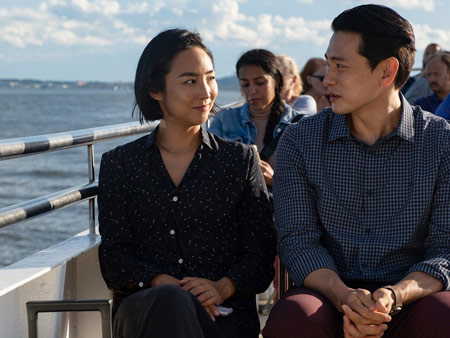Sunday, September 17, 3:30 pm
Rainbow Cinemas, Northumberland Mall
 Nora and Hae Sung, two deeply connected childhood friends, are wrest apart after Nora's family emigrates from South Korea. Two decades later, they are reunited in New York for one fateful week as they confront notions of destiny, love, and the choices that make a life, in this heartrending modern romance.
Nora and Hae Sung, two deeply connected childhood friends, are wrest apart after Nora's family emigrates from South Korea. Two decades later, they are reunited in New York for one fateful week as they confront notions of destiny, love, and the choices that make a life, in this heartrending modern romance.
Cast: Greta Lee, Teo Yoo, John Magaro
Director: Celine Song
Writer: Celine Song
Genre: Romance, Drama
Language: English (and some Korean)
Runtime: 1h 46m
Rating: PG-13 (Some Strong Language)
Review by Trace Sauveur
Past Lives begins in a bar, with an unseen couple playing a game where they attempt to figure out the relationships of their fellow drinkers. Right now, they’re probing the connections between three people: Nora (Lee), who is nestled between Hae Sung (Yoo) and Arthur (Magaro). Are the Korean Nora and Hae Sung together? Are they tourists here with their white tour guide? Or are Nora and Arthur actually the ones together? Nora looks into the camera knowingly, as if to communicate what the viewer likely already knows: It could never be so simple.
In her debut feature, writer/director Celine Song proceeds to tell a decades-spanning love story preoccupied with all the ineluctable fine details of life that decide the destination of one’s adulthood. The things we decide for ourselves and those that are chosen for us, the people you know now and those you once knew, the feelings that fade and the ones that remain with achingly sharp clarity. It is not a failed love story, but it is a lost love story, as its characters fall victim to the realities of time and circumstance and are left wondering what may have been if either of those things had been different.
 The film is highly autobiographical, with Song essentially rendering her own lived experience within the film as Nora. At 12 years old, Nora immigrates to Canada with her family, leaving behind her life in Seoul, which includes her childhood crush Hae Sung. Over the course of the next two decades, the pair reconnects online, fades apart again, and reconnects again in person when Hae Sung plans a trip to New York, where they have to grapple with the fact that neither of them is the person they were 20 years ago. How could they be?
The film is highly autobiographical, with Song essentially rendering her own lived experience within the film as Nora. At 12 years old, Nora immigrates to Canada with her family, leaving behind her life in Seoul, which includes her childhood crush Hae Sung. Over the course of the next two decades, the pair reconnects online, fades apart again, and reconnects again in person when Hae Sung plans a trip to New York, where they have to grapple with the fact that neither of them is the person they were 20 years ago. How could they be?
Lee and Yoo are electric together, conveying an excess of feelings both unspoken and not fully understood through their graceful exchange of looks and dialogue. The two implicitly understand the feelings they see in each other’s eyes, but is it a feeling of love? Or regret for already knowing that the opportunity has long passed? As well as a love story, this is also an immigrant story, and the connection Nora has with Hae Sung as a link back to her home country is not insignificant.
Caught between the two is Nora’s husband, Arthur, in a fantastic, apprehensive performance from Magaro. He understands his ostensible role in this story as the white husband coming between two long-lost Korean lovers, but a dramatic love triangle this is not. The dynamics between the trio are uneasy but cordial, each man faintly pained by the existence of the other, and Nora fraught in considering how each of them fits into her life. It’s a tricky dynamic expertly explored through Song’s delicate relaying of events. She has a remarkably deft touch behind the camera and tells this story with tactful specificity. It’s fun to consider the curiously diligent commitment to period detail during the 2010 era of the story, which is partially defined by outdated iPhone and MacBook interfaces and shoddy video calls preceded by the iconic Skype ringtone, until you realize that these are the types of specificities that can come to define your understanding of a relationship with someone. The most insignificant particulars grow to bear great meaning, and in turn, the quietest moments of the film can instantly become the most emotionally calamitous.
Song has a tendency to accentuate the space between Nora and Hae Sung. As the camera drifts between the two, the separation between them seems at once unremarkable and unbearably infinite, a gap that is impossible to close despite their close proximity. It’s a visual that strikes a painful, necessary chord: Some rifts are impossible to mend, but maybe it’s worth reconciling with their indelible nature. Past Lives is beautiful in all the ways it does just that.

